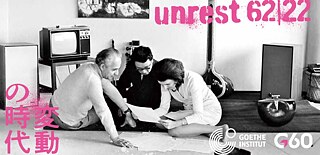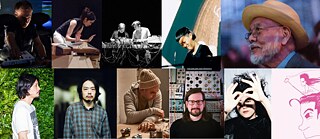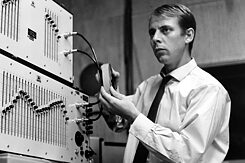Fri. May 27, 2022
7:00 p.m. JST
12:00 p.m. CET
Sat. May 28, 2022
7:00 p.m. JST
12:00 p.m. CET
program Grenzfrequenz /Tele Musicking
unrest 62|22
-
Goethe-Institut Tokyo, Hall, Tokyo
-
Price
May 27: 2.000 Yen
May 28: 3.000 Yen
May 27 & 28: 4.000 Yen (Tokyo at PEATIX)
11,50 Euro (Berlin at KOKA)

The Goethe-Institut Tokyo turns 60. On this occasion the series of events unrest 62|22 take a look at the early years of German-Japanese cultural exchange and invites artists* to reinterpret the electronic music scene of the 1960s from a contemporary perspective. Since it is not possible to experience music and social exchange together in one place, two locations are connected by two acoustic quadraphonic projection spaces that are played bidirectionally. In this way, the ideas from the 1960s also provide impulses for an experimental and creative encounter in the wake of the pandemic-related restrictions.
Friday, 27th May: Grenzfrequenz
12:00 CET, Japanisches-Deutsches Zentrum Berlin (Saargemünder Str. 2, 14195 Berlin)19:00 JST, Goethe-Institut Tokyo (7-5-56 Akasaka, Minato-ku, 107-0052 Tokyo)
Karl-Heinz Stockhausen - Telemusik (1966)
sound projection by Juan Verdaguer
Yasunao Tone - Music for Pump Organ (1962)
performed by Manami Kakudo
On 27th May the focus will be on the historical works with the acousmatic performance of TELEMUSIK by Karl-Heinz Stockhausen, the performance MUSIC FOR PUMP ORGAN (1962) by Yasuano Tone and accompanying lectures. In Telemusik, Stockhausen uses recordings from Japan and traditional music from different countries as mutual modulation sources to create an electronic world music. The work of Tone was produced when he was advocating "anti-music," exploring a different direction from Stockhausen, and in the 1970s it was re-performed with an anti-war message. Tone was one of the musicians who participated in the premiere of TELEMUSIK in Japan.
Saturday, May 28: Tele Musicking
12:00 CET, Japanisch-Deutsches Zentrum Berlin (Saargemünder Str. 2, 14195 Berlin)19:00 JST, Goethe-Institut Tokyo (7-5-56 Akasaka, Minato-ku, 107-0052 Tokyo)
On 28th May (Saturday) the idea will be taken up in the joint TELE MUSICKING experiment: The parallel acoustic experience space will be played by experimental and electronic musicians* between Tokyo and Berlin. Concerts and their quadraphonic recordings will be sent back and forth and reproduced acoustically in the other location. In the finale, the sound material from both locations will be used as mutual modulation sources in further live performances and merge into a new common music.
>

Mieko Suzuki (Turntables, Live Electronic)
Naoko Kikuchi (Koto)
Makoto Oshiro (Sound Objects)
Gebrüder Teichmann (Live Electronic, Cross-Modulation)
YPY (Electronics)
Tatsuhisa Yamamoto (Drums, Percussion & Objects)
ju sei (songs & etc.)
Tomoya Matsuura (Cross-Modulation)
okachiho (Cross-Modulation)
Additional Programme
13th May, 17.30, Auditorium, Superbooth 22, FEZ, Berlin
HAINBACH will talk about the technology and techniques of the early electronic music studios WDR and NHK, and examples of modulations will be demonstrated using Stockhausen's Telemusik. The lecture is the prelude to the music programme for the 60th anniversary of the Goethe-Institut in Tokyo. The lecture is accessible on link (GI YouTube page)
25th – 29th May, 14:00 – 19:00, Foyer, Goethe-Institut Tokyo
“Sisters With Transistors” by Lisa Rovner, UK/France, 2020, 86 min, English
Lisa Rovner’s superb documentary pays a deeply deserved, seldom-expressed tribute to the female composers, musicians and inventors from the brief history of electronic music, narrated by music icon Laurie Anderson.
25th – 29th May, 14:00 – 19:00, Foyer, Goethe-Institut Tokyo
“Kölner Klänge” – Das waren mal ganz neue Töne: Die faszinierende Geschichte des WDR-Studios für Elektronische Musik - und der Kampf um sein Vermächtnis, WDR Köln, online-Ausstellung Google Arts & Culture, (dt. Originalfassung)
Programme Concept: Gebrüder Teichmann
Curation: Makoto Oshiro, Andi und Hannes Teichmann
Produced by Goethe-Institut Toyko
Supported by Japanisch-Deutsches Zentrum Berlin
Related links
Location
Goethe-Institut Tokyo, Hall
7-5-56 Akasaka, Minato-ku
Tokyo
107-0052 Japan
7-5-56 Akasaka, Minato-ku
Tokyo
107-0052 Japan
